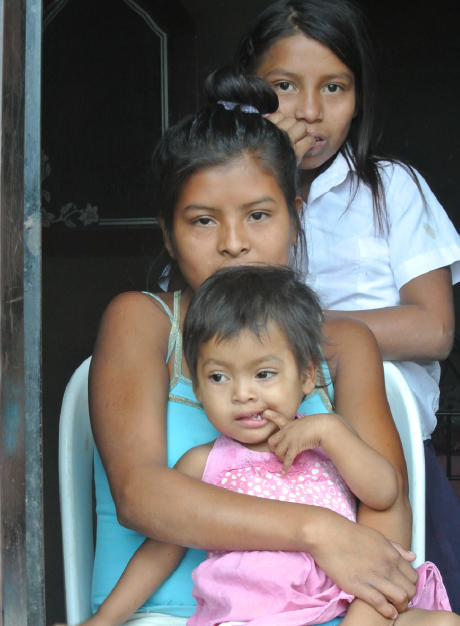
Ethnic restitution claims require manpower and time to properly document the history of large communities. LRDP partners with regional land restitution offices to expedite the process for vulnerable indigenous groups who are victims of the conflict.
The spiritual equilibrium essential to the Yukpa community is off balance. Ancestral burial grounds have been desecrated by invaders; the trees that house the spirits are being cut down; and the wild game that Yukpa men once hunted with zeal is no longer available. The same limitations preventing the community from practicing its culture are preventing Yukpa parents from passing these activities, words, and stories down to new generations.
“The loss of culture is very real. Our children won’t know anything about the Yukpa if we aren’t rescued from extinction. If we don’t have space to preserve our culture, I guarantee that in thirty years, our culture will disappear,” says Andrés Vence, council leader of a Yukpa community consisting of 120 families living on 300 hectares in the Sierra Perijá on the border of Venezuela and Colombia.
“Culture’s longevity depends on territory.”
There are an estimated 6,000 Yukpa remaining in Colombia, and the majority live on autonomous lands known as resguardos. Over the past thirty years, the Yukpa community living in La Laguna has been victim to abuse and intimidation as a result of the armed conflict and has seen its ancestral lands being increasingly occupied by “outsiders,” whom they refer to as colonists. Today, the community is pushing back by launching an ethnic restitution claim that seeks to recover 964 hectares of land and allow the community the space it needs to flourish.
Humiliation and Abuse
In 1982, the guerrilla group known as the FARC came to Yukpa territory to recruit. Andrés Vence was abducted for eight days to be indoctrinated. But he and the Yukpa resisted, and another guerrilla group known as ELN arrived the following year and abducted several young men. Armed with just bows and arrows, Vence and his men marched into the guerrilla camp and took their children back, saying the Yukpa would not participate in any war.
When the Colombian military entered the scene in the mid-1990s, things got even worse. Yukpa families could no longer move freely from house to house, leading to the systematic abandonment of more than 900 hectares of land. For years, military checkpoints restricted the flow of food between families. To make matters worse, paramilitary groups—who were often the same members of the military—came to the Yukpa villages at night to terrorize the community.
“They abused and humiliated us,” says Vence. “I think it was all in the hopes that we would open our mouths and say something that gave them the right to murder us.”
Documented History
In 2015, LRDP stepped in to partner with the regional Land Restitution Unit (LRU) in Cesar to expedite “characterization studies,” an essential piece of evidentiary material that documents the background, victimization, and suffering of indigenous communities who wish to reclaim their land. Characterization a critical step in substantiating an ethnic restitution claim.
Over the course of six months, researchers visited the Yukpas, where they interviewed individual members and held focus groups. They also collected materials from the government, nongovernmental organizations, academic texts, and the media. The end result is nearly 200 pages of history, mapping, experience, and evidence presenting how the armed conflict contributed to the decimation of the Yukpa’s culture, livelihood, and overall prosperity.
In addition to carrying out the characterization study, LRDP has helped regional restitution offices improve coordination with partner members of the Victims Assistance and Comprehensive Reparations System and municipal officials.
The document will be filed as part of the Yukpa community’s land restitution claim, which will go before a restitution judge before the end of the year. By law, judges must issue a ruling within six months after a restitution claim is filed in the court. In Cesar, the Yukpa case will be the third ethnic restitution case to reach the courts, making the department an important player in the nationwide effort to heal the historic rift between the government and indigenous groups.
There are currently over 24 ethnic restitution cases in the characterization phase that stand to affect over 10,000 families. In addition to the Yukpa case, LRDP is supporting the LRU with evidentiary studies in another complicated case involving over 600 ethnic Sikuani families in Meta.
“All over the country, there are ethnic restitution cases reaching judges. The LRU is in its fifth year and these cases are becoming more and more important to resolve. This particular case is very important because the Yukpa are losing their cultural identity, and we recognize that,” according to Chávez.
In its five years, restitution judges have issued three ethnic restitution sentences, delivering over 124,000 hectares of land back to indigenous communities.
As the Yukpa wait on the judge’s ruling, the case’s progress has emboldened Vence to mobilize the community—including the older citizens known as Yimayjas—to transmit the collective memory and cultural skills like weaving mochilas, practicing spiritual rites, and crafting shields to fend off malignant spirits.
A favorable ruling will be key to restoring Yukpa faith in the Colombian government. “We’ve put pressure on the government for many years to do this, so our hope is temporary. We watch television, and indigenous culture is never part of the conversation. Indigenous communities are the most vulnerable,” explains Vence.
“The partnership gave us operating capacity. Without this support, we would have taken another one or two years to get to this case.”
— Jorge Chávez, Director of the Land Restitution Unit in Cesar.

